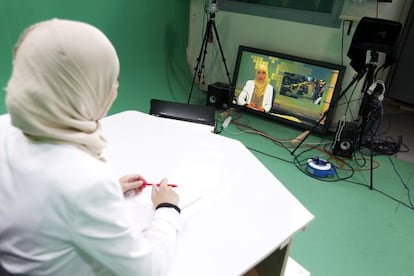Broadcasting Mecca to the masses
Islamic TV stations in Spain are working to bring Muslims closer to other religions

"Congratulations on the day of the most important feast of Islam!” Television viewers and friends kept calling the station on October 26 to celebrate Eid al-Adha (the Feast of the Sacrifice). Just hours earlier, Córdoba TV Internacional had offered viewers live coverage of the sermon at Mecca with expert commentary.
This Islamic station is not airing out of Cairo or Riyadh, but from a Madrid suburb called San Sebastián de los Reyes, and it does so in Spanish, occasionally offering simultaneous translation from Arabic so that Spanish-speaking Muslims will understand events like the Mecca sermon.
Córdoba TV Internacional is one of two television channels founded by Muslim groups that went on the air early last winter. The other one is the Iran-funded Hispan TV, headquartered in Tehran but with 50 percent of its programming made in Madrid.
Both were launched at the same time, but their content differs significantly. Córdoba TV seeks to “create awareness of Islam so that Muslims won’t be insulted or written off as terrorists,” explains channel director Yasin Puertas, 35.
Córdoba TV was created by the Saudi foundation Message of Islam, led by Sheikh Abd Al-Aziz Fawzan Al-Fawzan, a propagator of the Wahabi form of Islam, often described as radical.
“This \[station\] does not disseminate any Islamic school in particular,” says Puertas sharply. “Our goal is to build bridges between Muslims and followers of other religions in the Hispanic world. We practice what we preach: half of our 60 employees are not Muslim.”
A Spaniard from Melilla, who studied broadcast journalism in Madrid, Puertas eventually converted to Islam and married a councilor for Coalición por Melilla (CpM), the local Muslim political party. Before becoming the spokesman for the group, he was communications chief for a law firm in Houston, where he lived for nearly five years.
The eight hours of daily programming, which loop three times a day, have a markedly religious tone, though in no way an extremist one. There are religious outreach programs such as Cita con el Sheij (Meeting with the Sheikh), others like En femenino, which focuses on salient Muslim women, Árabe fácil (easy Arabic), which teaches the language, and an evening newscast. The female host wears a hijab but it is not mandatory for women who work at the station.
In fact, Puertas is proud of having hosted an Israeli anthropologist and the extreme-right-winger Armando Robles, former press chief for Jesús Gil in Marbella, who got caught up in a heated debate with three Muslim intellectuals, driving audience ratings through the roof.
“We even interviewed Josep Anglada on the street!” says Puertas, in reference to the Islamophobe politician from Catalonia.
Córdoba TV is currently available in Spain and Latin America through the Hispasat satellites, but little by little it is finding a space on Spanish TDT by renting out low-frequency channels — the least-powerful ones. It can be seen in half-a-dozen cities, including Madrid and Barcelona.
In most European countries, channels like Córdoba TV — and even more so in the case of Hispan TV — would have had no place on TDT (they would be on cable), but the digital chaos created by the Socialist government allowed them to find their niche.
Although it rents local frequencies, Hispan TV had bigger ambitions at first. Proof are its dozens of correspondents in Latin America, the US and the Middle East, who provide content for their 12 daily newscasts.
In this case there is a clear ideology that seeks to legitimize Iran’s political system. In fact, the channel was inaugurated with a speech from President Mahmud Ahmadinejad. But “the Spanish leg of this project has been cut back by over 60 percent,” says Mahmud Alizadeh, 42, who is in charge of Hispan TV in Spain. Before working in broadcasting, Alizadeh translated the Royal Academy’s Spanish dictionary into Farsi.
Tu suscripción se está usando en otro dispositivo
¿Quieres añadir otro usuario a tu suscripción?
Si continúas leyendo en este dispositivo, no se podrá leer en el otro.
FlechaTu suscripción se está usando en otro dispositivo y solo puedes acceder a EL PAÍS desde un dispositivo a la vez.
Si quieres compartir tu cuenta, cambia tu suscripción a la modalidad Premium, así podrás añadir otro usuario. Cada uno accederá con su propia cuenta de email, lo que os permitirá personalizar vuestra experiencia en EL PAÍS.
¿Tienes una suscripción de empresa? Accede aquí para contratar más cuentas.
En el caso de no saber quién está usando tu cuenta, te recomendamos cambiar tu contraseña aquí.
Si decides continuar compartiendo tu cuenta, este mensaje se mostrará en tu dispositivo y en el de la otra persona que está usando tu cuenta de forma indefinida, afectando a tu experiencia de lectura. Puedes consultar aquí los términos y condiciones de la suscripción digital.








































